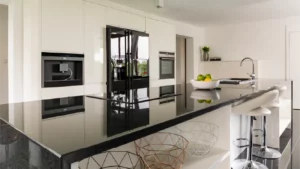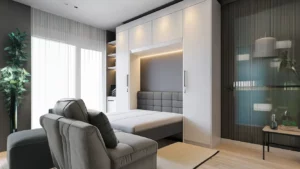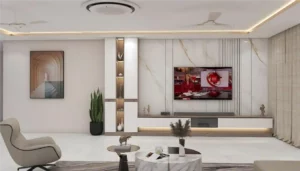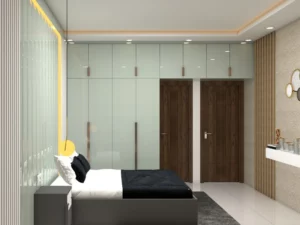Say Goodbye to Distractions! Design Your Ideal Coimbatore Study Space

Are you struggling to find the perfect study space in Coimbatore? Look no further! This ultimate guide will show you how to create the ideal study environment that enhances your productivity and focus. Whether you’re a student preparing for exams or a working professional seeking a quiet place to concentrate, this article has got you covered.
Coimbatore is a bustling city with numerous distractions, but with the right setup, you can transform any space into a haven for learning. We will explore practical tips and techniques to optimize your study area, from choosing the right furniture and lighting to eliminating distractions and incorporating personalized touches. By implementing these strategies, you will be able to maximize your study time and achieve your goals.
Whether you prefer a cozy corner in your bedroom or a dedicated home office, this guide will help you make the most of your study space in Coimbatore. So, get ready to unlock your full potential and take your productivity to the next level. Let’s dive in and create the perfect study space together!
Importance of a Well-Designed Study Space
Creating a well-designed study space is crucial for your academic or professional success. A clutter-free and comfortable environment can significantly improve your concentration, motivation, and productivity. Here’s why a well-designed study space is important:
1. Focus and Concentration: A dedicated study space helps you minimize distractions and focus solely on your tasks. By eliminating external disturbances, you can enter a state of flow, leading to increased efficiency and better learning outcomes.
2. Comfort and Ergonomics: Sitting for long hours can lead to physical discomfort and fatigue. A well-designed study space with ergonomic furniture ensures proper posture, reduces the risk of musculoskeletal issues, and allows you to study for extended periods without discomfort.
3. Organization and Efficiency: A well-organized study space makes it easier to find and access your study materials, reducing time wasted searching for things. When everything has a designated place, you can maintain a systematic approach to your studies, enhancing efficiency and reducing stress.
Factors to Consider When Creating a Study Space
Before diving into the specifics of designing your study space, it’s important to consider a few key factors. These factors will help you tailor your study space to your specific needs and preferences. Here are some factors to consider:
1. Location: Choose a location that is quiet and free from distractions. Consider the noise level, foot traffic, and proximity to sources of disturbance. If you live with others, discuss your study needs with them to ensure they understand the importance of maintaining a quiet environment.
2. Space Availability: Assess the space available to you and determine how much area you can allocate as your study space. Consider the dimensions of the room, available wall space, and any existing furniture or equipment that can be incorporated into your study area.
3. Natural Light: Natural light can have a positive impact on mood, focus, and overall well-being. Choose a location with ample natural light or position your study space near a window to benefit from natural daylight. However, ensure that direct sunlight does not cause glare on your study materials or computer screen.
4. Access to Amenities: Consider the proximity of amenities such as power outlets, internet connectivity, and storage options. Easy access to these amenities will make your study sessions more convenient and efficient.
Choosing the Right Location for Your Study Space
The location of your study space plays a significant role in your overall study experience. Here are some factors to consider when selecting the ideal location for your study space:
1. Quietness: Look for a location that is free from excessive noise, such as traffic, loud neighbors, or household activities. If possible, choose a room that is away from common areas and has soundproofing features or minimal sound transfer.
2. Privacy: Privacy is essential for deep focus and concentration. If you live with others, find a location where you can have privacy during your study sessions. It could be a separate room, a secluded corner, or a partitioned area within a larger room.
3. Comfort: Ensure that the location you choose is comfortable and conducive to long study sessions. Consider factors such as temperature control, ventilation, and the availability of comfortable seating options.
4. Lighting: As mentioned earlier, natural light is ideal for study spaces. However, if natural light is limited or unavailable, choose a location with adequate artificial lighting. Avoid harsh or dim lighting, as it can strain your eyes and affect your focus.
Remember, the location you choose should align with your personal preferences and study habits. Experiment with different locations to find the one that suits you best.
Furniture and Equipment for an Ergonomic Study Space
The right furniture and equipment are essential for creating an ergonomic study space that promotes comfort and productivity. Here are some key considerations when selecting furniture and equipment:
1. Desk: Choose a desk that provides ample workspace for your study materials, laptop, and any additional equipment you may need. The desk should be sturdy, well-sized, and at a comfortable height to prevent strain on your neck and back.
2. Chair: Invest in an ergonomic chair that supports good posture and provides proper lumbar support. Look for adjustable features such as height, armrests, and backrest inclination to customize the chair according to your preferences.
3. Storage Solutions: Optimize your study space by incorporating storage solutions for organizing your study materials. Consider shelves, drawers, or wall-mounted organizers to keep your books, stationery, and other essentials easily accessible and well-organized.
4. Monitor or Laptop Stand: If you use a desktop computer or prefer an elevated laptop display, consider investing in a monitor or laptop stand. This will help you maintain an ergonomic viewing angle, reducing strain on your neck and eyes.
Remember to arrange your furniture in a way that promotes a comfortable and efficient workflow. Position your desk and chair to ensure proper posture and easy access to your study materials.
Lighting and Color Schemes for Optimal Focus
Lighting and color schemes can greatly influence your focus, mood, and overall study experience. Here are some tips for optimizing lighting and color in your study space:
1. Natural Light: Whenever possible, position your study space near a window to benefit from natural light. Natural light is known to enhance alertness and productivity. However, ensure that the direct sunlight does not cause glare on your workspace or screen.
2. Artificial Lighting: If natural light is limited, choose artificial lighting options that provide even illumination across your study area. Avoid harsh or dim lighting, as it can strain your eyes and affect your focus. Use adjustable desk lamps or floor lamps to customize the lighting according to your needs.
3. Color Schemes: Selecting the right color schemes can create a conducive atmosphere for studying. Opt for neutral or cool colors such as light blue, green, or gray, as they promote a calm and focused environment. Avoid vibrant or distracting colors that may hinder concentration.
Experiment with different lighting setups and color schemes to find the combination that works best for you. Remember, everyone’s preferences may vary, so choose what helps you stay focused and motivated.
Organizational Tools and Storage Solutions
Effective organization is key to maintaining a productive study space. Here are some organizational tools and storage solutions to consider:
1. Desk Organizer: Invest in a desk organizer or caddy to keep your stationery, pens, and other small items within reach. This will help you avoid clutter and maintain a tidy workspace.
2. Digital Organization: Utilize digital tools such as note-taking apps, cloud storage, and task management software to keep your digital files and study materials organized. This will help you easily find and access your resources whenever needed.
3. Labels and Folders: Use labels and folders to categorize and sort your physical study materials. This will make it easier to locate specific resources and maintain an organized filing system.
4. Whiteboard or Bulletin Board: Install a whiteboard or bulletin board near your study area to jot down important reminders, create to-do lists, or display motivational quotes. This will help you stay organized and visually track your progress.
Remember to regularly declutter and reorganize your study space to maintain an efficient workflow. A well-organized environment promotes a clear mind and enhances productivity.
Personalizing Your Study Space for Motivation and Inspiration
Personalizing your study space can make it more inviting and motivating. Here are some ideas for adding personal touches to your study area:
1. Inspirational Quotes: Print or create your favorite inspirational quotes and display them in frames or on a corkboard. These quotes will serve as reminders of your goals and aspirations, keeping you motivated during challenging study sessions.
2. Photos and Memories: Surround yourself with photos or mementos that evoke positive emotions. Display pictures of loved ones, travel memories, or achievements to create a sense of comfort and inspiration in your study space.
3. Plants and Greenery: Incorporate indoor plants or succulents into your study space. Plants not only add a touch of nature but also improve air quality and create a calming atmosphere.
4. Comfort Items: Place a cozy blanket, cushions, or a favorite scented candle in your study space to create a comfortable and inviting ambiance. These small comforts can help you relax and focus during long study sessions.
Remember, personalizing your study space should be done in moderation. Avoid cluttering your workspace with too many decorations that may distract or overwhelm you.
Creating a Distraction-Free Environment
Distractions can significantly hinder your ability to concentrate and study effectively. Here are some strategies for creating a distraction-free study environment:
1. Digital Distractions: Minimize digital distractions by turning off notifications on your phone or computer. Use website blockers or apps that restrict access to social media or other non-essential websites during your study sessions.
2. Noise-Canceling Headphones: Invest in noise-canceling headphones to block out external sounds and create a focused atmosphere. Listen to instrumental music or white noise if it helps you concentrate better.
3. Establish Ground Rules: Communicate with those around you and set ground rules to minimize interruptions during your study time. Let them know your study schedule and the importance of maintaining a quiet environment.
4. Separate Work and Study Spaces: If you work from home, it’s crucial to create a clear distinction between your work and study spaces. This will help you mentally separate the two and avoid distractions related to your work responsibilities.
By implementing these strategies, you can create an environment that supports deep focus and concentration, allowing you to make the most of your study sessions.
Study Space Maintenance and Organization Tips
Maintaining a clean and organized study space is essential for sustained productivity. Here are some tips to help you maintain an efficient study environment:
1. Regular Cleaning: Dedicate time each week to clean and declutter your study space. Wipe down surfaces, dust shelves, and organize your materials. A clean and tidy study area promotes a clear mind and enhances productivity.
2. Daily Reset: Develop a habit of resetting your study space at the end of each study session. Put away materials, return books to their designated places, and clear your desk of any unnecessary items. This will ensure a fresh start for your next study session.
3. Digital Organization: Regularly organize and declutter your digital study materials. Delete unnecessary files, create folders, and ensure your digital resources are easily accessible. This will save you time and prevent digital clutter from affecting your focus.
4. Evaluate and Adjust: Periodically evaluate your study space and make adjustments based on your evolving needs. As you progress in your studies, you may require additional resources or find that certain organizational methods are more effective. Stay flexible and adapt your study space accordingly.
By incorporating these maintenance tips into your study routine, you can ensure a consistently productive and organized study space.
Conclusion: Enjoying a Productive and Focused Study Experience
Creating the perfect study space in Coimbatore is within your reach. By considering factors such as location, furniture, lighting, organization, personalization, and distraction-free environment, you can design a study area that enhances your productivity and focus.
Remember, your study space should reflect your personal preferences and study habits. Experiment with different setups and make adjustments until you find the perfect balance that optimizes your learning experience.
So, whether you’re a student preparing for exams or a working professional seeking a quiet place to concentrate, follow the tips and techniques outlined in this ultimate guide to create the perfect study space in Coimbatore. Unlock your full potential, take control of your study environment, and achieve your goals with ease!
FAQ - About WPC Modular Kitchen
WPC stands for Wood Plastic Composite, a material made by combining wood fibers with thermoplastics. It offers the aesthetic appeal of wood with enhanced durability and resistance to moisture, termites, and scratches. This makes WPC an ideal choice for modular kitchens, which require materials that can withstand daily wear and tear while maintaining a stylish appearance. Yes, WPC is water resistant and can be a good choice for kitchen cabinets
Anbre Interiors specializes in utilizing WPC for various elements of modular kitchen designs, including cabinets, countertops, shelves, and kitchen islands. Our expert designers customize WPC components to match your preferred style, whether it’s modern, rustic, or minimalist. We ensure that the WPC elements are seamlessly integrated into your kitchen for both functionality and aesthetics.
WPC modular kitchens offer several advantages:
- Durability: Resistant to moisture, termites, and scratches.
- Low Maintenance: Easy to clean with simple wiping.
- Eco-Friendly: Made from recycled materials, reducing environmental impact.
- Customization: Available in various colors, textures, and finishes.
- Longevity: Withstands the rigors of daily kitchen use, ensuring a long-lasting installation.
Yes, WPC is considered eco-friendly because it is made from recycled wood fibers and plastics. By using materials that would otherwise contribute to waste, WPC helps reduce environmental impact. Additionally, its durability means fewer replacements over time, further contributing to sustainability.
WPC modular kitchen solutions are generally more durable than traditional wooden kitchens. WPC is resistant to moisture and termites, common issues that can damage wooden kitchens. It also doesn’t warp or crack over time, ensuring that your kitchen maintains its look and functionality for years.
Maintaining a WPC modular kitchen is straightforward:
- Cleaning: Wipe surfaces with a damp cloth and mild detergent.
- Avoid Harsh Chemicals: Use gentle cleaning agents to preserve the finish.
Regular Checks: Inspect hardware like hinges and handles periodically to ensure they remain functional.
Absolutely! WPC is highly versatile and can be customized in a wide range of colors, textures, and finishes. Whether you prefer a natural wood look or bold, vibrant colors, Anbre Interiors can tailor WPC components to match your specific design preferences.
Yes, Anbre Interiors provides a warranty on our WPC modular kitchen installations. We are committed to customer satisfaction and offer after-sales services to address any issues or concerns you may have post-installation. Please contact us for specific warranty details.
The installation timeline varies depending on the complexity of the design and the size of your kitchen. On average, it can take anywhere from 2 to 4 weeks from the finalization of the design to the completion of installation. Anbre Interiors strives to complete projects efficiently without compromising on quality.
The cost of a WPC modular kitchen depends on several factors, including the size of your kitchen, the design complexity, and the materials chosen. For a detailed quote, please contact Anbre Interiors, and we’ll provide a customized estimate based on your specific requirements.
While WPC is suitable for cabinets, shelves, and decorative elements, its use for countertops and flooring is less common due to the higher demands on these surfaces. For countertops and flooring, materials like granite, quartz, or specialized laminates are typically recommended. However, WPC can be used for areas with less direct impact. Anbre Interiors can advise you on the best materials for each part of your kitchen.
Yes, one of the significant advantages of WPC is its resistance to termites and moisture. Unlike natural wood, WPC does not attract termites, and its composition prevents it from absorbing moisture, reducing the risk of swelling or warping.
Getting started is easy! Contact Anbre Interiors through our website or give us a call to schedule a consultation. Our design team will work with you to understand your needs, preferences, and budget. We’ll then create a customized modular kitchen design using WPC, ensuring it aligns with your vision and lifestyle.
























